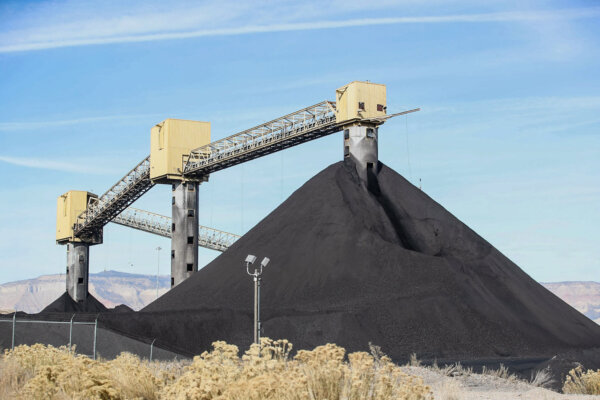State Attorneys General Sue BlackRock, Vanguard, State Street, Alleging Conspiracy Against Coal

‘BlackRock, Vanguard, and State Street formed a cartel to rig the coal market,’ Texas Attorney General Ken Paxton alleged.
Eleven state attorneys general, led by Texas Attorney General Ken Paxton, have filed an anti-trust suit against the world’s three largest asset managers—BlackRock, Vanguard, and State Street.
The suit alleges that the asset managers, which together control nearly $25 trillion in third-party investors’ money, have acted in unison against the coal industry in pursuit of climate-related CO2 reduction goals.
“BlackRock, Vanguard, and State Street formed a cartel to rig the coal market, artificially reduce the energy supply, and raise prices,” Paxton said in a Nov. 27 statement. “Their conspiracy has harmed American energy production and hurt consumers.”
According to a 2020 study by the American Liberties Project, the “Big Three” asset managers, taken together, are the largest shareholders in 88 percent of the companies listed in the S&P 500 index. This gives them tremendous power when it comes to corporate proxy voting on behalf of investors in their funds, and they have sparked controversy in recent years over what critics say is their leveraging of this power to achieve environmental and social goals.
BlackRock is the largest of the three, with approximately $11 trillion under its management. By comparison, America’s entire GDP was $27 trillion at the end of 2023, according to the World Bank.
The text of the lawsuit alleges that “for the past four years, America’s coal producers have been responding not to the price signals of the free market but to the commands of Larry Fink, BlackRock’s Chairman and CEO, and his fellow asset managers.”
Consequently, the supply of coal used to generate electricity has been “artificially depressed—and the price has skyrocketed,” the attorneys general said.
“Defendants [BlackRock, Vanguard, and State Street] have reaped the rewards of higher returns, higher fees, and higher profits, while American consumers have paid the price in higher utility bills and higher costs,” they alleged.
In response, BlackRock spokesperson Alexander Williams stated that his company has invested billions into Texas energy and that “the suggestion that BlackRock has invested money in companies with the goal of harming those companies is baseless and defies common sense.”
“BlackRock’s holdings in energy companies are regularly reviewed by federal and state regulators,” Williams told The Epoch Times. “We make these investments on behalf of our clients, and our focus is on delivering them financial returns.”
State Street spokesperson Brendan Paul also responded, saying: “As long-term capital providers, we have a mutual interest in the long-term success of our portfolio companies. This lawsuit is baseless and we look forward to presenting the facts through the legal process.”
Coal Industry in Decline
Over the past couple of decades, there has been a dramatic decline in the U.S. coal industry, which was the largest producer of electricity nationwide before 2005.
In a 2022 industry analysis, the U.S. Energy Information Administration (EIA) cited the trend of electricity utilities progressively shutting down coal plants, stating that “due to continued competition from natural gas and renewable resources, 23% of the 200,568 megawatts (MW) of coal-fired capacity currently operating in the United States has reported plans to retire by the end of 2029.”
The decline of America’s coal industry is partly due to the rise of natural gas, wind, and solar energy. It is also partly a result of government efforts, which were ramped up during the Biden administration, to tighten emissions limits on coal plants, many of which have since closed.
Climate activists, while aiming to reduce the use of fossil fuels in general, target the coal industry in particular because coal emits more CO2 and pollutants than oil and gas. According to analytics group Our World in Data, coal accounted for about 15 billion of the 38 billion tons of CO2 emitted worldwide in 2023.
In December 2023, U.S. climate envoy John Kerry told the U.N. COP 28 global warming summit that the Biden administration “will be working to accelerate unabated coal phase-out across the world, building stronger economies and more resilient communities.”
In 2022, President Joe Biden said his administration was focused on shutting down coal plants across the country and making way for wind and solar energy.
The financial sector has also shown antipathy toward the coal industry.
A 2023 report by the Institute for Energy Economics and Financial Analysis found that more than 200 international banks, insurance companies, export credit agencies, and development banks said they would divest from coal. These companies included AIG, Allianz, AXA, Bank of America, Barclays, BlackRock, Citibank, Fidelity, Goldman Sachs, JPMorgan Chase, and UBS.
A report released in 2017 by InfluenceMap, an analytics company, found that more than 500 investment managers, with $1.4 trillion in assets under management, pledged to divest from coal, making coal plants “largely uninvestable.”
Overall, U.S. coal production has declined from 922 million tons in 2012 to 517 million tons in 2024, according to data analytics company CEIC. Thus far, however, the transition to wind and solar energy has not brought down electricity prices.
Consumer Harm Alleged
Proponents of the lawsuit brought by the attorneys general say that the agenda to reduce or eliminate U.S. coal production has resulted in higher electricity prices for consumers, as well as lost jobs and a more fragile electricity grid. Unlike wind and solar energy, coal-fired plants can be ramped up and down on demand, which helps to balance supply and demand throughout the grid; and unlike natural gas, which relies on continuous delivery from pipelines to plants, coal can be stored on-site.
“This is such a perfect concrete example of where the American people, and specifically the citizens of these 11 states, were directly in material harm,” Will Hild, executive director of Consumers’ Research, told The Epoch Times. “And so I think this is a perfect time for these states to stand up for their citizens and make these companies pay for what they’ve done, because it certainly cost the pocketbooks of the citizens of their states.”
The lawsuit cites the asset managers’ membership in global climate clubs such as the U.N.-sponsored Net Zero Asset Managers Initiative (NZAM) and Climate Action 100, which describes itself as “an investor-led initiative to ensure the world’s largest corporate greenhouse gas emitters take appropriate action on climate change.”
According to NZAM’s website, the pact includes more than 325 asset managers with $57.5 trillion in assets under management who have committed to “supporting the goal of net zero greenhouse gas emissions by 2050 or sooner.” It lists both BlackRock and State Street Global Advisors among its signatories.
State Street, together with JPMorgan Chase, quit Climate Action 100 in February, and BlackRock transferred its membership to its international subsidiary to limit its involvement. Vanguard quit NZAM in 2022 and is not a member of Climate Action 100.
In a 2020 interview with CNBC Television on how BlackRock managed clients’ energy investments, the asset manager’s CEO, Larry Fink, stated, “If our clients want to put money in the S&P [500] or a specific energy fund, we are not denying that.”
“The only segment where we said we’re not investing it is in thermal coal,” Fink said.
However, in 2022, BlackRock stated to a British parliamentary committee that it would not stop investing in coal, oil, and gas and that it was not its goal to “engineer a specific decarbonization outcome in the real economy.”
“These companies seem to be backing away from these commitments, but we need to keep the pressure on,” Hild said. “They haven’t really paid a price yet for what they’ve done to the American people, and I think this suit, and hopefully the massive damages that come out of it, will both dissuade the defendants in this case from ever doing it again, but also other people who are engaged in similar conspiracies.”
The suit was filed by attorneys general from Texas, Alabama, Arkansas, Indiana, Iowa, Kansas, Missouri, Montana, Nebraska, West Virginia, and Wyoming.
The Epoch Times contacted Vanguard for comment but did not receive a reply by publication time.



